Reform 05: PM Ends ‘Inspector Raj’ in Labour, But Big Reforms Still Awaited
 India presently has 40 central laws and over 150 state labour laws (file photo: Reuters)
India presently has 40 central laws and over 150 state labour laws (file photo: Reuters)
Prime Minister Narendra Modi has unveiled measures to end ‘Inspector Raj’ (rule by inspectors) in labour, with a system that is expected to curb labour inspectors’ discretion and provide a single window compliance process for companies on labour-related issues.
All 1,800 labour inspectors will no longer be allowed to target specific companies. Instead, a computerised system will randomly send them on inspections, based on data trends and objective criteria. Following their inspections, they will have to upload their reports within 72 hours and cannot modify them thereafter, preventing the possibility of bribes being taken to change reports.
“Let’s start with trust,” said Modi at an event organised by the labour ministry on Thursday. “Ease of business is the first and foremost requirement if Make In India has to be made successful,” he said, referring to his campaign to increase manufacturing in India.
Central labour inspectors have already been sent text messages to sensitise them to the reforms, and the ministry expects the annual inspections – currently about 300,000 –to come down sharply.
According to BBC News, under the present rules factories are allegedly selected arbitrarily for inspection by government departments, leading to complaints of harassment of the owners.
A new website, managed by the labour ministry, will allow companies to fill forms online and raise their grievances.
"These facilities are what I call minimum government, maximum governance. I have been hearing about Inspector Raj since childhood," the prime minister said.
India’s complex labour rules have kept away large-scale private investments, with more than 40 central laws and over 150 state labour laws that are seen as time-consuming, costly and archaic.
According to World Bank, India has one of the world's most rigid labour markets, but successive governments have failed to undertake labour reforms, fearing a backlash from trade unions.
For 64-year-old Modi, however, the priority is to create jobs for the 100 million young Indians who will enter the workforce over the next decade or so.
The daunting challenge is to enhance their skills to make them ready for employment. Keeping that in mind, the prime minister launched the Apprenticeship Protsahan Yojana to revamp the country’s apprenticeship programme, which currently provides training to 2,82,000 apprentices. The programme will support an additional 100,000 apprentices in the period up to March 2017.
These initiatives, Modi said, would create an opportunity for India to provide skilled manpower to the world.
Industry leaders welcomed the initiatives.
“Simplification of procedures has been a long standing concern for industry,” said Chandrajit Banerjee, director general of Confederation of Indian Industry (CII).
However, trade unions remained sceptical. “The announcement of the new schemes is most welcome but we have to wait and watch for the actual implementation,” said B N Rai, president of Bharatiya Mazdoor Sangh.
But big-ticket labour reforms are still some way off. These include allowing companies to hire and fire, which could allow them to scale up or down depending on market conditions. True flexibility in labour practices will probably only be possible when the NDA gets a majority in the Rajya Sabha, allowing it to pass politically challenging legislation.
To Learn More:
Labour reforms, at last: PM Modi’s moves will give a fillip to job creation in SMEs (by R Jagannathan, FirstBiz)
India unveils key labour reforms (BBC News)
PM Narendra Modi unveils labour reforms (Hindustan Times)
Modi Cabinet clears labour reform Bills (Business Standard)
- Top Stories
- Controversies
- Where is the Money Going?
- India and the World
- Appointments and Resignations
- Unusual News
- Latest News
- India College Chain’s Expansion into U.S. Draws Opposition from Massachusetts Officials over Quality of Education
- Milk Shortages in India Tied to Release of New Movies Featuring Nation’s Favorite Stars
- Confusion Swirls around Kashmir Newspaper Ban in Wake of Violent Street Protests
- Polio-Free for 5 Years, India Launches Vaccine Drive after Polio Strain Discovery
- New Aviation Policy Could Increase Service, Lower Ticket Prices






Comments